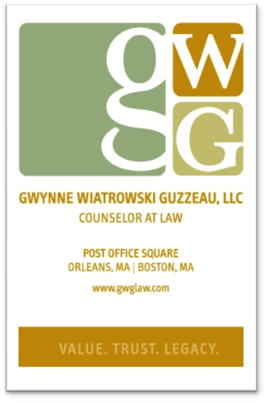Back to Basics II
by Gwynne Wiatrowski Guzzeau
In my last column, we reviewed how to get your legal affairs in order so that others will have the authority to assist you when you need care during your lifetime.
Now that you've got your Durable Power of Attorney in place and your Health Care Proxy appointed, it's time to consider what will happen to your assets when you die. In this column, I'll provide an overview of the third component of a basic estate plan: your Last Will and Testament.
Your Last Will directs the disposition of your assets upon your death. Anything you own in your own name cannot be transferred to your heirs until the Executor named in your Will is appointed by the Probate Court.
The Probate Court oversees and facilitates the transfer of assets owned in your individual name: first, by proving the Will is indeed your true Last Will; then, appointing the Executor; then, accepting the Inventory of assets prepared by the Executor; and finally, accepting the accounts showing distribution of the assets by the Executor in accordance with your Will.
Starting in January 2012, there will be two ways to probate a Will: formal probate, as described above; and, informal probate. The informal probate procedures will offer a simpler and quicker way to get appointed as an Executor and to settle an estate through the Probate Court.
If you don't have a Last Will, then Massachusetts law will determine who receives your assets after your death. Most people would rather control where their belongings and assets go, yet many people find it difficult to sit down and prepare a Last Will or to even schedule a meeting with an attorney who can write one for you.
So, what do you need to write a Last Will? Again, I refer readers and clients to our CLAMS library system which has many titles regarding do-it-yourself estate planning.
Estate lawyer Gwynne Waitrowski Guzzeau brings some legal ease to the ever-changing laws that are now going into effect.
In particular, you can search the system for "NOLO" publications that include a CD with sample forms for you to complete yourself.
As you know, one of my favorite NOLO publications is 101 Law Forms For Personal Use. In addition, The Busy Mom's Guide to Estate Planning is another user-friendly NOLO title. Even if you aren't a do-it-yourself type, I urge everyone to educate themselves a little bit before meeting with an attorney.
Of course, the forms are only as good as their fit with your individual circumstances. That's why many people choose to work with a lawyer to draft a Last Will. Sure, lawyers of every stripe have their own forms and templates, too. So what you want to find is an attorney who will truly take the time to understand your goals and tailor their forms to fit your needs.
Now down to the nitty-gritty. Here are a few things to think about including in your Last Will:
Your Stuff: What happens to all the possessions and articles of daily living? What about the more valuable or sentimental belongings? If you know where you want these items to go, then say so in a memorandum attached to or included as part of your Last Will. The other alternative is to enjoy the pleasure of gifting some of your belongings now, while you're alive and can share the stories and meanings that the objects hold for you.
Your Assets: If accounts or real estate is owned jointly then it passes to the survivor, not in accordance with the terms of your Last Will. So create a list of your assets and review how each asset is owned (jointly, individually, etc.), then be certain that the outcome meets with your goals. This is a good project to do with a fee-only financial advisor or an attorney.
Your People: Think about not only who will be named in your Last Will and the share you wish to leave each person, but who will be the best person to serve as the Executor to carry through with your instructions.
Well there you have it. More homework.
Of course, maybe you have some questions. If so, send them to CapeWomenOnline and I'll do my best to respond in my next column.
Thanks for reading and remember, meeting with an estate-planning attorney is the best way to ensure that your documents fit your circumstances.
The information in this column is not intended to be legal advice, rather it is offered for informational purposes.
Gwynne Wiatrowski Guzzeau is a lawyer and entrepreneur. She lives with her family in Orleans.
If you have questions for Gwynne please email the Editor at CapeWomenOnline.
You can also visit Gwynne's website at www.gwglaw.com
 |

